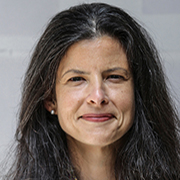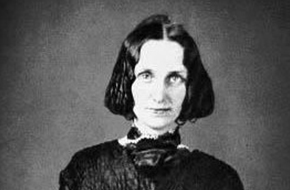Nicole Ruane
 Nicole J. Ruane teaches in the department of Classics, Humanities and Italian at the University of New Hampshire. Her research and teaching focuses on religion, gender, sacred texts, and religious violence. She holds the Ph.D. and M.A. from Union Theological Seminary in NYC and is the author of Sacrifice and Gender in Biblical Law (Cambridge University Press, 2013) as well as articles and book chapters.
Nicole J. Ruane teaches in the department of Classics, Humanities and Italian at the University of New Hampshire. Her research and teaching focuses on religion, gender, sacred texts, and religious violence. She holds the Ph.D. and M.A. from Union Theological Seminary in NYC and is the author of Sacrifice and Gender in Biblical Law (Cambridge University Press, 2013) as well as articles and book chapters.
Contact
University of New Hampshire
Durham, NH 03824
nicole.ruane@unh.edu
Available Program Formats: In person or online presentations
Nicole Ruane's Programs

God, the Early Years: A Brief History of God in the Rise of Judaism, Christianity and Islam
Do the three major monotheistic religions worship the same deity? Nicole Ruane traces the rise of the deity who comes to be known as The Lord, God the Father, and Allah from his earliest form as a young god (known as Yah, Yahu or Yahweh) in the area of Syria-Palestine, later merged with the father deity of the local pantheon known as El, and on across the Middle East and through the centuries. Judaism, Christianity, and Islam spread knowledge of this deity, in his various forms, throughout the world. The program will end by examining the question of whether these three religions worship the same deity or whether their understandings of the divine are sufficiently different that they refer to different gods.

Mary Baker Eddy: New Hampshire's Most Important Religious Thinker
Mary Baker Eddy was New Hampshire's most important and most innovative religious thinker. Mark Twain called Eddy "the most interesting woman that ever lived, and the most extraordinary." The church she founded, The Church of Christ, Scientist, profoundly affected both American ideologies of religion as well as public opinion of the role of women in society. This program discusses the ways in which Eddy's experience as a woman in Victorian-era America influenced her gendered understanding of God as well as the nature of humanity, the body, health, and the place of women in powerful organizations. In Eddy's theology, the divine was not punishing but welcoming and caring; not a domineering father but a loving father-mother – a perspective that uplifted the feminine in both the divine realm and the human world. Although Eddy's perspectives on healing have always been controversial, her rejection of medicine stemmed from encounters with nineteenth-century physicians that she felt were demeaning and violating. Eddy instead advocated a patient-centered method of self-empowered healing, a perspective that has much in common with later views of positive psychology and the power of the mind over the body.